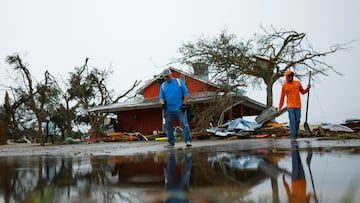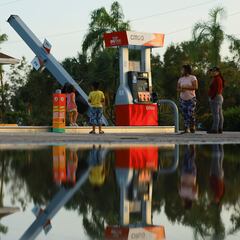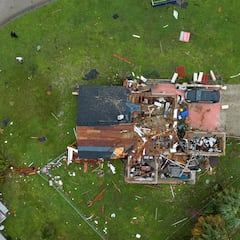Beware of scams: How to spot fraud in aid for victims of Hurricane Milton
Following Hurricane Milton, authorities are warning of possible scams in aid to victims. We share with you how you can detect them.

On Wednesday, October 9, Florida was hit by Hurricane Milton which made landfall as a Category 3 storm during the night, causing storm surge and tornadoes that resulted in the deaths of at least 23 people; while thousands more residents faced property damage.
As recovery efforts continue, authorities are urging all those affected to remain vigilant and alert to scammers who often prey on vulnerable people seeking help in the aftermath of a disaster.
How to spot scams in hurricane relief efforts
According to the Federal Emergency Management Agency (FEMA), scams often focus on financial aid and fake charities; victims are urged to not provide their personal or financial information, whether by phone or mail, to anyone.
“FEMA will never ask for your personal financial information over the phone or through email,” the agency warned in a press release, in which it also denied that survivors seeking help will only receive a payment of $750.
‼️ FEMA crews, housing inspectors & other officials will be working in areas impacted by #Milton. They carry official photo identification badges.
— FL Division of Emergency Management (@FLSERT) October 14, 2024
Follow the tips below to defend against fraud & visit https://t.co/nfDMe4H80e for more recovery info. pic.twitter.com/DnPfcmFVFT
You may also be interested in: How you can help those affected by hurricanes Milton and Helene
“To help people quickly obtain essentials like food, water or baby formula, FEMA will give out $750 in assistance, also known as Serious Needs Assistance – but it’s not the only form of assistance available to disaster survivors,” the agency clarified on a webpage it specifically set up to debunk false claims and rumors.
Another risk of scams comes from fake contractors who purportedly offer to perform repairs related to tropical cyclone damage. In Pinellas County, officials have urged residents to be vigilant and avoid hiring services without first checking the contractors' licenses and credentials.
“If the company you’re dealing with is a little invasive, if they’re not answering your questions, if they’re demanding the money up front, if there’s a pressure to act right away, that’s when you should take a step back and say, ‘I’m going to try to find somebody else,’” Melanie McGovern, a spokeswoman for the Better Business Bureau, told CNN.
Related stories
Special attention is also being paid to senior citizens, who are unfortunately more vulnerable to scams. According to the Better Business Bureau (BBB), in these types of emergencies, scammers try to convince elderly residents to give up their insurance claims in order to divert money that belongs to the victims.
To prevent fraud, it is recommended that you verify the identity of those offering help and make sure you only work with official companies and organizations. If you or someone you know has questions, do not hesitate to contact the FEMA Helpline at 1-800-621-3362, where you can verify whether the officials offering help are legitimate. You can also report fake charities and scams to the National Disaster Fraud Center.


Complete your personal details to comment